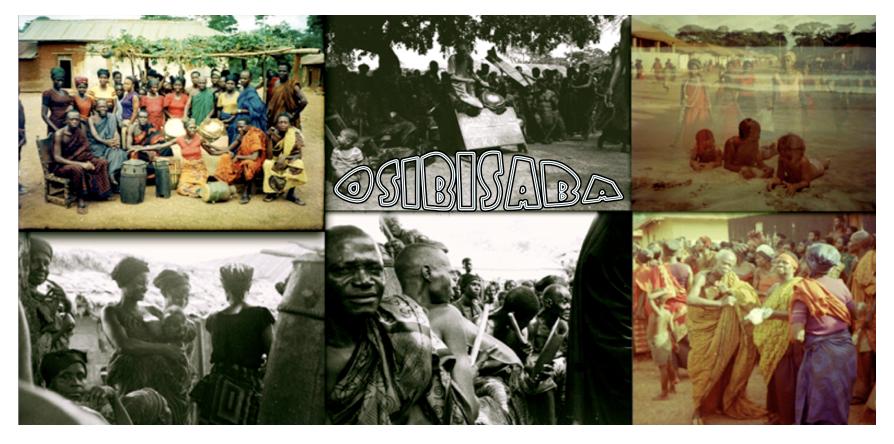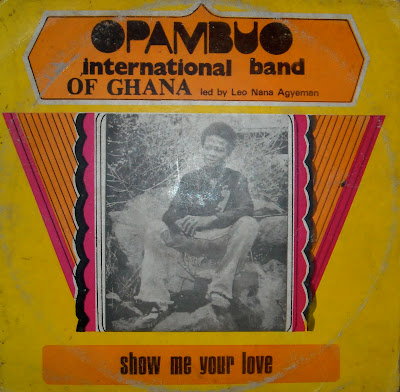Hello. Very sad news today from preeminent highlife scholar/musician John Collins, whose Bokoor House and BAPMAF highlife archives were recently damaged during severe flooding on October 26th, 2011. Please take some time to read the statement below by Collins, originally posted on Afropop Worldwide. Collins welcomes suggestions, letters of sympathy, and donations (a mailing address is listed below). Also, a short BBC news story about the aftermath of the flood damage HERE.
Dear colleagues, supporters, fans, friends and well wishers,
As you know I have been operating the BAPMAF music archives since 1990 which was partly opened at my Bokoor House to the public in 1996 and more fully in 2007. However, devastation struck in the middle of the night of 26th Oct, 2011 in the form of a flood. This occurred over many parts of Accra due to more and more people building in or blocking water ways - so that rivers could no longer easily run into the sea. In our particular Taifa-Ofankor area this was compounded by the construction of a 3 mile section of the Kumasi highway (from Achimota to Ofankor) without adequate gutters - and also saw-millers who have been dumping sawdust in rivers and wetlands.
 We residents have complained to both the Ghana National Highways Authority and the Ga District Assembly (Council) over the years to no avail Indeed the National Highways Authority told us residents that they had to build the road first before constructing the drains and that these 2 projects even fell under 2 different ministries. Furthermore, the saw-millers in the MUUS next to us, who are relative newcomer to the area, did not allow space on their adjacent land to ours for a gutter. In fact, by dumping sawdust on the drainage river (Brenyah River) they re-directed part of this river though my house and garden – which broke my wall – they are even now claiming my garden is their ‘natural’ gutter.
We residents have complained to both the Ghana National Highways Authority and the Ga District Assembly (Council) over the years to no avail Indeed the National Highways Authority told us residents that they had to build the road first before constructing the drains and that these 2 projects even fell under 2 different ministries. Furthermore, the saw-millers in the MUUS next to us, who are relative newcomer to the area, did not allow space on their adjacent land to ours for a gutter. In fact, by dumping sawdust on the drainage river (Brenyah River) they re-directed part of this river though my house and garden – which broke my wall – they are even now claiming my garden is their ‘natural’ gutter.The resulting flooding on the 26 Oct. was unprecedented with almost 6 feet of water entering our land and 5 feet into the downstairs house and premises where some of the BAPMAF archival holdings are kept. I was in Mali at the time at an African popular music conference organized by the French Institute in conjunction with and the Malian Ministry of Culture. On returning to Ghana on the 29th I met my family perched upstairs in the BAPMAF exhibition space. They had escaped drowning by 2 minutes due to a timely call from a neighbor upstream who noticed the water build up and got them to leave the house and flee upstairs.
Some of the losses are as follows:
• Approx 10-20% 0f BAPMAF archival holding lost. Some we are still
trying to dry and salvage.
• Loss of all electronic equipment including materials donated a few
years ago to the BAPMAF archives by the German Goethe Institute for a
digitization project.
• Loss of car, backup generator, various pumps, etc.
The house and area is now too dangerous for human habitation (i.e. residential purposes ). All this due to the short sightedness of the government in not insisting the National Highways Authority build storm gutters alongside the highway they have been constructing for seven years (which incidentally also went under water on the 26th Oct). And also the government’s inability to stop individuals or saw-millers etc from building on or blocking natural water flows.
As this is not likely to be resolved in the near future I have no recourse but to remove myself and my family from the house that myself and my father before me have been living since the 1970’s – and find rented property where we will not be drowned like rats.
Bokoor Band - Yaka Duru
So my immediate plans are as follows:
- Find temporary storage space for the BAPMAF archives so that at some point in the future these can become available again to myself and the general public.
- Find temporary accommodation relatively near the university at Legon.
- Build circa 200 feet of reinforced concrete wall with gravel embankment to protect the Bokoor/BAPMAF proper from future flooding – so I and the BAPMAF archives can move back to upstairs properties. This alone will cost around 7000$.
- To replace lost equipment, computers, car, scanners, cameras, digital record player, stabilizers, chargers and 12 volt battery backup system, slide projector, etc.
- At some point I will write to various individuals and organizations that donated general books, videos and DVD’s and music materials to BAPMAF to send me, if possible, copies.
- To replace the broken wall and add an embankment to it - or possibly even build a wall and embankment closer to my house and the BAPMAF premises. Even though I will lose my garden this will keep the building premises intact - so that in the future and the government demolishes obstacles to the water course, stops the saw-miller dumping saw dust in rivers and get the Highways Authority to build a storm drain alongside the Achimota-Ofankor Highway --I could at least use the BAPMAF premises again.

If you have any suggestions as how I could proceed – including any agencies, individuals, organizations who could assist financially or by replacing lost books and music this would be most appreciated. Letters of sympathy would also be most welcome.
Yours sincerely John Collins (Prof).
POSTAL ADDRESS: P.0 Box LG 385, Legon , Accra, GHANA
EMAIL: newbapmaf@yahoo.comIf money is sent to help rebuild please send it to my UK bank account at follows.
NATWEST, Tottenham Court Rd Branch
P.O.BOX 2EA 45 Tottenham Court Rd. London WIT 2EA
Reward Reserve Account of E .J. Collins
Account number 26592258
Sort Code 56-00-31
Swift code NWBK GB 2L
IBAN number GB16 NWBK 56003126 5922 58


















































